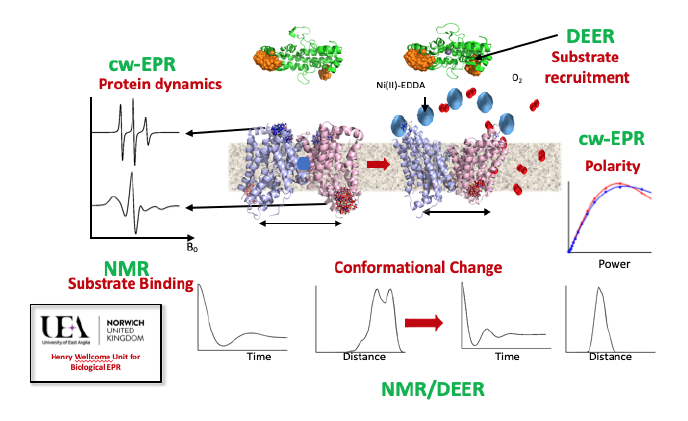Abstract
Research in the Henry Wellcome Unit for Biological EPR at UEA focuses on the architecture and functional dynamics of membrane proteins, many medically relevant with a special interest on membrane transport systems and their interaction with intra‐cellular signalling pathways. There is increasing evidence that membrane proteins do not act alone, but that they are organised as nano‐machineries which function through the concerted action of its individual components with high precision and specificity observed in both time and space. We are seeking to unravel the principles underlying the architecture and dynamics of these protein nano‐machineries as well as their function and regulation. Our experimental approach focuses on the use of Electron Paramagnetic Resonance (EPR) techniques in combination with molecular biological, biochemical and other biophysical methods including theoretical MD approaches. Our expertise lies in the development and application of novel EPR techniques to address these key questions.
In this presentation I will focus on recent method developments, which may allow a shifting of the focus of this technique away from being considered purely a niche technique towards a more universal structural biological tool. I will use examples from our recent work on membrane and metallo‐proteins (methane monooxygenase & nitrate reductase), membrane transporters (GltPh & P‐glycoprotein) and bacterial SBDs (MamM from Magnetospirillum gryphiswaldense MSR‐1) to demonstrate
the power of this technique to deliver key mechanistic insight into e.g. how to resolve multiple distances in complex macromolecular complexes, how to observe conformational change within membrane proteins at a molecular level and finally to identify the molecular determinants of metal binding.
This research is funded by The Royal Society and the Wellcome Trust as well as being embedded within both the EU COST Action CM1306 “Understanding Movement and Mechanism in Molecular Machines” and the recently awarded EU‐ITN ‘NeuroTrans’.
FRASER MACMILLAN obtained a Dr. rer. nat. in Chemistry at the Institute of Organic Chemistry, Freie Universität Berlin, Germany. Currently he holds a position of Reader of Chemistry in the School of Chemistry at the University of East Anglia in Norwich, U.K where he heads the Henry Wellcome Unit for Biological EPR spectroscopy. Previously he has been a post‐doctoral researcher at the Technische Universität Berlin, Germany; the Commissariat à l’énergie atomique (CEA) in Saclay, France (as a Marie‐Curie Individual Fellowship holder) and as a junior research group leader in the Biological Magnetic Resonance Centre (BMRZ) at the Goethe Universität Frankfurt am Main, Germany. Upon returning to the UK he was awarded a prestigious Wolfson Research Merit Award from The Royal Society. He has been Chair of several EU COST Actions and is part of the recently awarded EU‐ITN ‘NeuroTrans’ network (start date March 2020). In 2020 he will be EPR Chair of the 61st Rocky Mountains Conference on Magnetic Resonance (https://rockychem.com). His current research interests include the development and application of cw‐ and pulsed electron paramagnetic resonance (EPR) methods; Site‐directed spin labelling of diamagnetic proteins; Understanding the molecular mechanism and dynamics of membrane transport processes, protein‐protein interactions and multi‐drug efflux.
[email protected]
IRB contact person: Nadica Maltar‐Strmečki, [email protected]
HBD contact person: Tomislav Vuletić, [email protected]
*SEMINAR Hrvatskog biofizičkog društva



